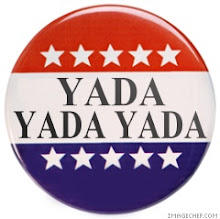"Instead of acknowledging an error in judgement, people tend to reformulate their views in a new way that justifies their old opinions. " Writes Leon Festinger. It's certainly been demonstrated.Do people moderate their views when presented with overwhelming evidence to the contrary? Not necessarily, writes Matthew Syed in today's BBC News Magazine. He concludes, as did Festinger when he coined the term nearly 50 years ago, that experiments demonstrate that
"We use a series of post hoc manoeuvres to reframe anything inconvenient to our original position. We question the probity of the evidence, or the credentials of the people who discovered it, or their motives, or whatever. The more information that emerges to challenge our perspective, the more creatively we search for new justifications, and the more entrenched we become in our prior view."Experimental confirmation of this is copious and other evidence such as a study by Amazon.com some years ago showing that people who read political books never reach across the divide, sticking with those that confirm a certain mindset.
"Our reasoning, or at least that what we offer as the product of reasoning is regulated by emotion, not by dispassionate analysis and its goal is to minimize threats to the self" Writes Mario Livio and the rampant and irreconcilable differences in opinion concerning most aspects of American life would seem to make it irrefutable. Nobody changes their mind, or at least very rarely. You'll see it at the macro and micro ends of the scale of things. Listen to Joe Biden tell us there are more deadly shootings because "the bullets are getting bigger" when the opposite is true although part of a fear raising agenda. To say otherwise means accepting you were wrong, your mentors are wrong and your argument is less than impeccable. So we go on restating the problem as though our pet solution were attached to it and ours alone.
But of course the size of bullets is less relevant than other factors, but to address that, to offer more rigorous analysis of a real problem risks fracking a fragile code, a rickety dogma that can raise the fear of an ontological crisis. "Who am I if all my axioms are false?" Our defenses are sometimes Manic, We respond with a flurry of arguments as though to be a moving target. We respond with laughter or mockery or denunciation. I'm tempted to call up the ghost of Melanie Klein and her Manic Defense in which we downplay and minimize the threat with feelings of control, triumph and contempt. Is that what we hear from conservatives as their maxims demonstrate their fragile origins? Perhaps I'm overreaching. This wasn't meant to be a critique of adept but sophistical refutations of fact. It's about the sloppy street versions that sloppy street people adhere to often with violence as a response to perceived offense.
This triumphant and contemptuous banner was offered recently on the Internet and to some people it explains away a frequent criticism of the Black Lives Matter organization. It is of course an attempt at an argument by analogy using an incomplete or broken analogy. The disinterested might observe that not only is the premise that the universality of the specific argument is not an attack on its validity but rather its foundation. To say that only black lives matter is not a moral position. Universality gives it a basis. And of course our theoretical outside and dispassionate observer would inevitably notice that recognition of the universal need for food would result in those with it being required to share it, and not to withhold it. Humanists of course, by asserting universal human rights, are not denying justice to anyone nor by their belief supporting injustice. It's being perceived as an attack only because it attacks the unspoken premise that "only our group matters" Because it equates the group and only the group with working for justice.
If saying "all lives matter" does not rectify injustice, neither does "black lives matter." Neither does chanting "hands up." There is no refutation. Neither offers a solution anyway. It's really not an argument but an attempt to explain contradiction by reformulating the opinion, and doing a really bad job of it. Would black lives matter if no others did? What is a "black life?" Teacher is asking, why isn't your hand up?
But you'll see that as true of false depending not on my argument or theirs but as a result of your political conditioning, group identification, propensity to feel guilt or indeed the need to feel it. Is the cop innocent or guilty? You knew that before the trigger was pulled. How would you feel if innocence or guilt could be proved beyond a shadow of a doubt? Would you doubt anyway would you scoff triumphantly at the evidence or launch into an excoriation of the NRA?
That our aversion to loss far outweighs the attractiveness of gain is well demonstrated. Face it, you don't want to be proven wrong which means you don't want to learn, which means you're just another dumb human ape, like all of us. You will defend the dumb argument, appending all kinds of hypothetical sophistry to it. I'll praise or smugly deny according to my a priori attitudes and I will fight till the end.


No comments:
Post a Comment